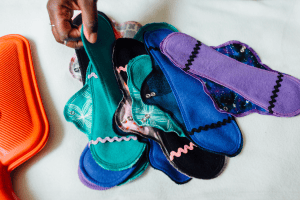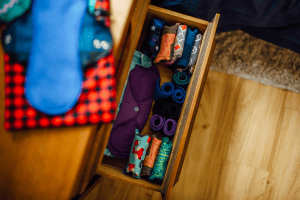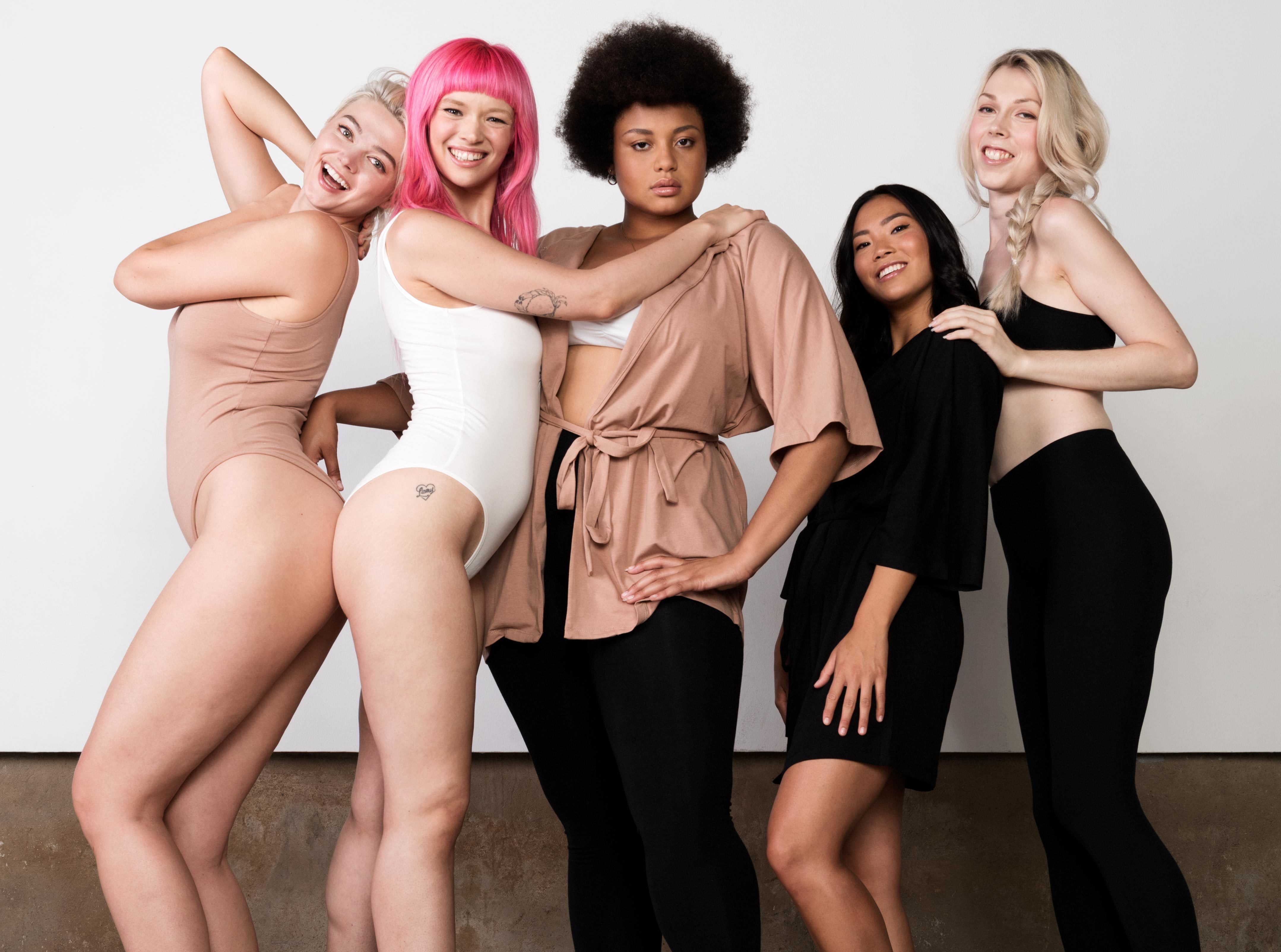Even in the 21st century, menstruation continues to be a topic, surrounded by issues of stigma, shame, embarrassment and pain. Thousands of women worldwide still don’t have access to female hygiene products, but even those who do are constantly exposed to health risks associated with disposable pads and tampons, ranging from allergic reaction to toxic shock syndrome. In addition, female hygiene products account for an astonishing amount of non-degradable waste: in North America alone, approximately 20 billion disposable menstrual products are being sent to landfills annually.
The more alarming research is being published on the topic, the more women are making a switch to reusable hygiene products. Lunapads, an online store selling sustainable pads, underwear and menstrual cups, aims to educate women about their health and make the switch easier. We spoke to Suzanne Siemens, founder and CEO of Lunapads, about the origins of the brand, aspirations for the future and the challenges that come with going sustainable.
How was your brand born? Was sustainability in the picture from the beginning?
Suzanne: The company was born in 1993 when Madeleine Shaw, then an aspiring fashion designer, was experiencing health complications from using disposable tampons. She took her creative skills to design a product that would be comfortable, sustainable and effective to meet her menstrual needs. From there she discovered that the products were an expression of her feminist and ecological values and changed the way she viewed her period. Disposable products are not only a monthly financial burden that carries a heavy cost to the environment (over 20 billion pads, tampons and applicators are thrown away every year) but they are often marketed to imply your period is embarrassing, annoying and shameful. Lunapads was born out of a desire to not only offered a healthy choice to disposables but also smash the stigma about periods.
Why did you initially choose to switch from disposable to reusable products? Was it primarily for health or environmental concerns?
S: For Madeleine, it was a health concern, as she was allergic to disposable tampons. For myself, it was primarily an environmental concern, matched with a curiosity to try something progressive and attractive. Disposable products are made from a host of synthetic materials that can potentially emit harmful dioxins and that take hundreds of years to biodegrade, making reusables a logical choice for both health and environmental reasons.

IN THE PHOTO: Lunapads founders, Madeleine Shaw and Suzanne Siemens. CREDIT: Jackie Dives
Many women fear that switching to reusable sanitary products will mean worse hygiene and potential health problems. How do you reassure your potential customers? Did you consult doctors when developing your products?
S: It is actually the opposite in terms of health and hygiene. Disposable products can cause health problems from minor irritation and rashes to serious allergic reactions, including toxic shock syndrome. We have had many doctors and naturopaths endorse and recommend our products to their patients, including Dr Jerilynn Prior, founder and CEO of CeMCOR, the Centre for Menstrual Cycle and Ovulation Research. I know switching to reusable menstrual products requires an adjustment to your monthly routine and I often experience the “ick” factor when telling consumers about reusables. People who choose reusables have been able to overcome the stigma about blood and periods and ultimately find it quite liberating to not experience their bodies this way anymore.

IN THE PHOTO: Lunapads products. CREDIT: Jackie Dives
What is most important for you in your work? What inspires you?
S: My background and training were in business, and so the most important part of my work is leading and operating under a set of values that supports a prosperous, sustainable and inclusive economy. My goal is to prove that you can run a company with both purpose and profit and inspire all businesses to actively embrace this ethos for long-term sustainability and social equity. It’s why Lunapads is proud to be a “Best for the World” B Corporation.
IN THE PHOTO: Lunapads products. CREDIT: Jackie Dives
What is your consumer like? Can you describe her?
S: Our customer is a menstruator who prioritizes her health and her community. She shops ethically and is an advocate for social equity and ecological sustainability. She works for change in both local and global contexts. In short, she’s a feminist and lives her values proudly.
You call yourself a “social mission”. How do you see the future of your brand? Where would you like to be in 5 years?
S: The future of our brand is to become a louder voice for intersectional feminism. In five years we are a brand recognized as leaders in the movement for menstrual equity and applauded for our innovative approach to business that values social purpose, profit and the planet.
In your opinion, what are the main challenges faced by entrepreneurs trying to make their businesses sustainable today?
S: Valuing sustainability is not a cost that is properly reflected in our market. For example, products that are not fair trade or sustainably made are always going to be cheaper as long as there remains an implied “subsidy” in their pricing because the full societal or environmental cost of making that product or service has not been truly accounted for. I realize this is a difficult thing to do; think for a moment of what the true cost a litre of gasoline should be. For practical reasons, consumers are price sensitive and will not always be willing to pay a higher price for something that is more sustainable or carries greater social value. So, entrepreneurs choosing sustainability face the added challenge of marketing and pricing their products to consumers who may not appreciate their product’s full value proposition. It’s a lofty challenge: educating consumers, supporting more transparency (more on that later) is costly and time-consuming. Social entrepreneurs need to be resilient and dedicated in order to succeed.
 IN THE PHOTO: Lunapads products. CREDIT: Jackie Dives
IN THE PHOTO: Lunapads products. CREDIT: Jackie Dives
In your opinion, what needs to change in the industry for it to become ‘greener’?
S: For starters, the personal care industry needs to be more transparent, including disclosing the ingredients, the manufacturing, waste creation and disposal process. Did you know that manufacturers of menstrual products are not required to disclose the ingredients used in products that will touch one of the most sensitive, and in the case of tampons, most absorbent part of your body? This type of disclosure is unlikely to happen voluntarily, so I’m in favour of greater advocacy and industry regulation to increase transparency and improve consumer education. Consumers can do their part by advocating for that transparency from their elected officials (US Congresswoman Carolyn B. Maloney has been advocating for greater disclosure for decades) and regulatory bodies like the FDA.
RELATED ARTICLES:
LET’S TALK PERIODS – Jessica Brassington
MENSTRUAL HYGIENE REVOLUTION: GREEN THE RED WITH SAATHI – Cinantyan Prapatti
Has your own life changed since you’ve made sustainability a core principle of your work?
S: I try hard to practice sustainability in my personal life (ie: I’m a conscious consumer, avid recycler and composter) and actively try to influence decisions that happen at home and in my community. It may get tiresome for others to hear me preach and push for change, but it’s important to set a good example; even small changes are a worthwhile effort.
What advice would you give to entrepreneurs who are thinking of starting a sustainable business?
S: Surround yourself and learn from people who are leading the change you wish to see. Do your homework and ask them for help in their specific area of expertise. People are always willing to give time to support someone who is genuinely engaged in making a positive change in an area they share a passion for. We cannot do this alone!
 IN THE PHOTO: Lunapads products. CREDIT: Jackie Dives
IN THE PHOTO: Lunapads products. CREDIT: Jackie Dives
Featured Photo Credit: Jackie Dives
Editors note: The opinions expressed here by Impakter.com columnists are their own, not those of Impakter.com















